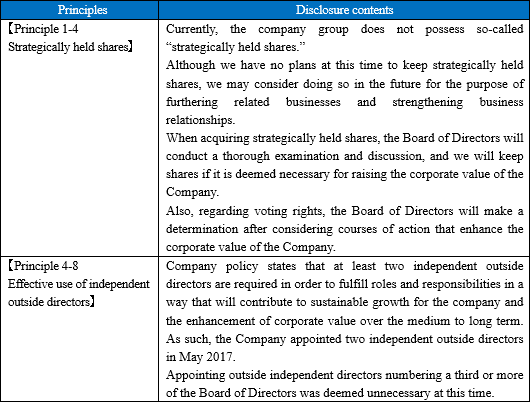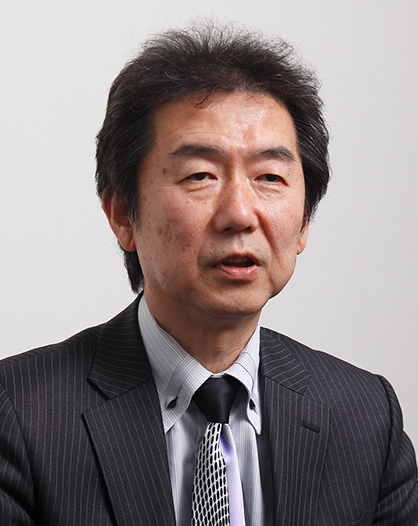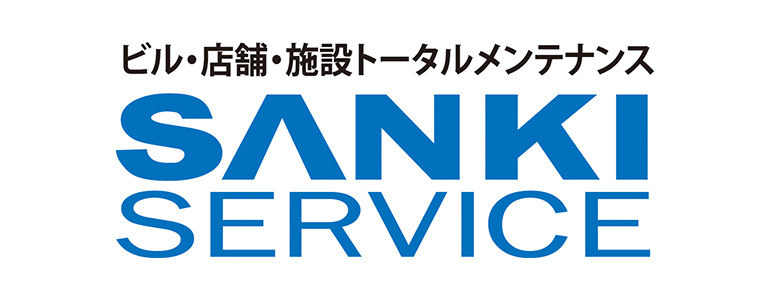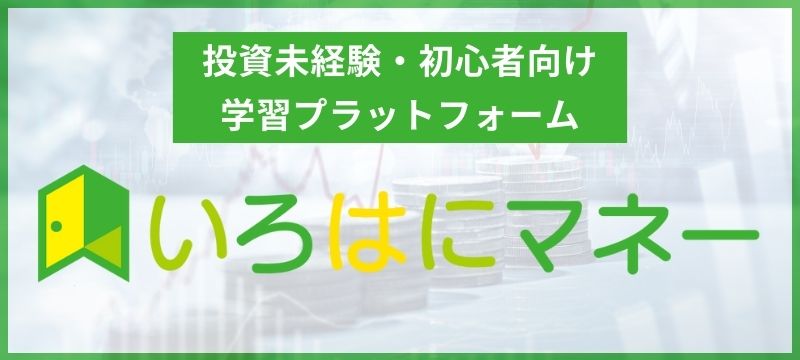SANKI SERVICE CORPORATION engages in the "Comprehensive Maintenance Business" which provides stores and various institutions with maintenance services in a bundled manner for air conditioning equipment, kitchen equipment, freezers, refrigerators, etc., the "Specific Manufacturer's Product Maintenance Business" in which the Company, as a store designated for manufacturer maintenance services, has been devoted to maintenance, replacement, and repair work for large-sized air conditioning equipment manufactured by the Panasonic Group, and the "Energy Saving Business," which is related to services of enhancing energy efficiency, such as work of increasing energy efficiency of professional-use large-sized air conditioning equipment and work of installing light-emitting diode (LED) lights. The advanced technologies and stable recurring-revenue business are the Company's forte. Based on the stably growing Specific Manufacturer's Product Maintenance segment, the Company aims to expand the Comprehensive Maintenance Business segment and overseas businesses, and boost profitability.
【1-1 Corporate history】
SANYO Air Conditioning System Services Co., Ltd. (currently known as Panasonic Commercial Equipment Systems Co., Ltd.), which strived to expand the business of selling large air conditioning equipment across Japan, looked for a store designated for manufacturer maintenance services to outsource the services of installation, assembly, trial operation, maintenance, and management of equipment in each area, and in October 1976, Hyogo Kiko Co., Ltd. undertook the business as part of the operations of its Machinery Department.
In July 1977, SANKI SERVICE CORPORATION was founded, and the "Maintenance Business" was fully launched.
The relationship between SANYO Air Conditioning System Services and the Company was strong from the beginning as demonstrated by the fact that the Osaka Center of SANKI SERVICE was set up within the Osaka Center Office of SANYO Air Conditioning System Services. In addition, earning fine reputation for its efforts to precisely satisfy the needs of SANYO Air Conditioning System Services, which desired to move ahead swiftly with business expansion, and to focus on building an organizational structure through proactive recruitment activities and enrichment of educational programs, including technical training, the Company was entrusted with businesses in areas other than Osaka as well and set up the Tokyo Center in October 1977 followed by opening of the Nagoya Center in April 1978, which accelerated business expansion to the Tokyo, Nagoya and Osaka regions.
Then, the Company set up offices in Kobe and Sapporo, propelling nationwide business expansion. In September 1998, it founded Shanghai Sanki Building Facility Service Co., Ltd. designed for maintenance services of air conditioning equipment in Shanghai, China.
Meanwhile, in September 2000, the Company established a call center that opens 24 hours a day, 365 days a year and started expanding the "Comprehensive Maintenance Business," which is currently one of its three core businesses, throughout Japan. In an effort to accelerate the Comprehensive Maintenance Business in China, it opened a call center available all year round in Shanghai in February 2012.
The Company got listed on the Japanese Association of Securities Dealers Automated Quotations (JASDAQ) of the Tokyo Stock Exchange (TSE) in April 2015. It was transferred to the Second Section of TSE in April 2016, and then to the First Section of TSE in April 2017, just 2 years after the listing.
【1-2 Corporate philosophy】

In addition to the aforementioned philosophy, the Company has cited "promise," "greetings," "dialogue," "youth," and "skills" as its "5 customer-trust-building rules of conduct."
【1-3 Market environment】
As mentioned later, while it is hardly likely that restaurants and retail stores using equipment of various kinds, such as air conditioners, heating and cooling instruments, and kitchen equipment, can increase sales significantly under the deflationary environment, cost management will be considered the most important point for fighting through the competition.
Restaurants and retail stores that are propelling opening of chain stores, in particular, have strong needs for total cost reduction by managing each piece of equipment in accordance with a single national-scale standard.
The Company estimates the scale of the Comprehensive Maintenance segment at about 3 trillion yen (*), and considers forging ahead proactively with development of this broad market.
*With regard to the Company's major clients in 3 business categories (food service, distribution, and entertainment), it is assumed that maintenance cost makes up 3% of the sales of their chain stores operating all across Japan.
The Company's major competitors include some listed companies, such as Nippon Air Conditioning Services Co., Ltd. (4658; TSE 1st section) and Shin Maint Holdings Co., Ltd. (6086; TSE Mothers), and several unlisted companies. In the Comprehensive Maintenance segment, the Company has to vie with services departments of equipment manufacturers.
In order to compete with these companies, SANKI SERVICE has performed self-analysis, concluding that its strengths are "enriched call center services available all year round," "capabilities to deal with emergencies nationwide," "advanced systematization, including online systems," and "abilities to handle equipment of every manufacturer and kind."
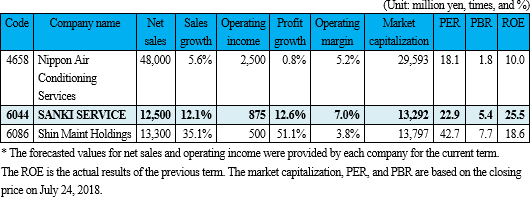 【1-4 Business contents】
1. Business Field
【1-4 Business contents】
1. Business Field
The Company engages in 3 businesses, including the "Comprehensive Maintenance Business," "Specific Manufacturer's Product Maintenance Business," and "Energy Saving Business."
*The reporting segments were the following 2 segments, "Air Conditioning Equipment Maintenance Business" and "Comprehensive Maintenance Business," up until the term ended May 2017; however, in the term ended May 2018, the Company changed its organizational structure with the aim of increasing its company-wide productivity and expeditiously providing services with high added-value by gathering personnel in charge of sales who had been allocated to each business department for establishment of a centralized point of contact, and managing its own maintenance engineers uniformly for propelling multi-skill development. As a result of the reconsideration of reporting segments with business expansion, including these changes in the corporate structure, and the actual situation of the business management system taken into account, the Company has judged that it is reasonable to deem the Group's businesses in a unified way and appropriate to use a single reporting segment.
① Comprehensive Maintenance Business
The Comprehensive Maintenance Business aims to expand business to larger markets using the techniques cultivated in the Specific Manufacturer's Product Maintenance Business.
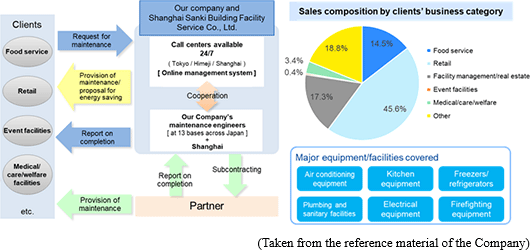
Targeting the food service industry and retail chain stores, which are its major clients, the Company has comprehensively undertaken maintenance services for air conditioning equipment, kitchen equipment, freezers and refrigerators, electrical equipment, plumbing and sanitary facilities, and firefighting equipment, regardless of manufacturers and models.
In the food service and retail industries, chain stores that have a competitive edge in terms of financial power and economies of scale are increasing market share under the prolonged deflationary environment; however, it is difficult even for the chain stores to rapidly boost sales, and cost management is the high-profile issue for winning the fierce competition.
Even under such circumstances, in the case of many chain stores, the chain headquarters itself or each chain store requests the business operator specializing in each piece of equipment for maintenance, inspection, and troubleshooting. This has made it not only difficult for the chain stores to focus on their regular businesses but also impossible for them to perform proper cost management in terms of time and money due to the variables in service quality, post-maintenance reports, and prices.
In contrast, the Company enters into a bundled contract with the headquarters of each chain store and offers intensive management of each piece of equipment in accordance with a single nationwide standard. Therefore, SANKI SERVICE can control the service quality and price by serving as the one that is solely responsible for receipt of requests and submission of reports, which allows client companies to concentrate on their core businesses and properly manage costs.
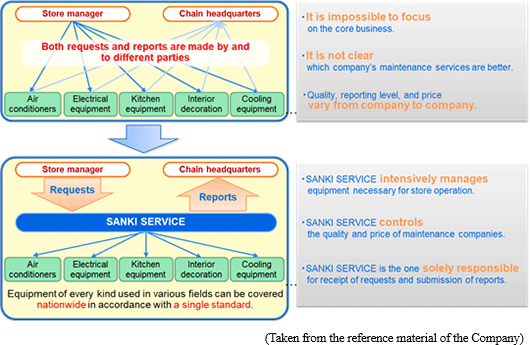
In addition, the Company can respond swiftly through its call centers available 24 hours a day, 364 days a year, reports on repair using its website, and real-time risk forecasts drawn from a variety of data, such as the usage status and time-related deterioration of equipment, accurately fulfilling the needs of the food service and retail industries that cannot suspend business even when trouble occurs.
Furthermore, the Company covers agent businesses such as production of fiscal budgets and dead-line work witnessing, businesses related to compliance including tasks to deal with legal amendments and submit notifications to administrative organs, formulation of security plans for opening new shops and redesigning existing shops, facility cleaning and prevention of insects and rats, and tenant replacement.
As mentioned above, the Company's strengths are not only capabilities to deal with simple repairs and malfunctions but also the ability to provide "optimum management of total costs," which is aimed not just at cost reduction through outsourcing, including indirect costs, for which the Company has gained excellent reputation from client companies that hope to concentrate business resources to their respective priority fields.
Both about 200 maintenance engineers of the Company, who work for the 13 bases across Japan, and partner companies to which the Company has entrusted maintenance works (about 2,000 companies in Japan) visit clients' stores and provide maintenance services.
<Example proposals in Comprehensive Maintenance Business>
[Case 1. Proposal made to a major convenience store chain for uniform management of maintenance of air conditioning equipment]
No. of target stores: About 20,000
Target area: Throughout Japan
Operating hours: 24 hours a day, 365 days a year
(Client's current situation and issues revealed through interview)
 The client traditionally entrusted maintenance to a business operator that is not a specialist. Air conditioning troubles were not solved; on the contrary, the number of troubles kept going up.
The client traditionally entrusted maintenance to a business operator that is not a specialist. Air conditioning troubles were not solved; on the contrary, the number of troubles kept going up.
 The data accumulated were not used properly for improvement.
The data accumulated were not used properly for improvement.
The Company brought forward the following proposal in response to such circumstances:
 Unexpected needs for repair can be reduced by regularly cleaning and inspecting air conditioning equipment.
Unexpected needs for repair can be reduced by regularly cleaning and inspecting air conditioning equipment.
 Management by the Company that specializes in air conditioning systems makes it possible to present proposal for improvement which takes advantage of the accumulated data.
[Case 2. Proposal made to one of the largest ready-made meal (boxed lunch) chains in Japan for repair request acceptance by call centers]
Management by the Company that specializes in air conditioning systems makes it possible to present proposal for improvement which takes advantage of the accumulated data.
[Case 2. Proposal made to one of the largest ready-made meal (boxed lunch) chains in Japan for repair request acceptance by call centers]
No. of target stores: About 3,000
Target area: Throughout Japan
Operating hours: 24 hours a day, 365 days a year
(Client's current situation and issues revealed through interview)
 The head office bore enormous administrative burdens, and indirect costs (personnel expenses) were increasing.
The head office bore enormous administrative burdens, and indirect costs (personnel expenses) were increasing.
 The client used multiple maintenance providers and thus could not manage maintenance in a unified manner, resulting in a huge total cost for repair (the economies of scale were not used properly).
The client used multiple maintenance providers and thus could not manage maintenance in a unified manner, resulting in a huge total cost for repair (the economies of scale were not used properly).
 An increase or decrease in the number of stores made it difficult to control personnel expenses.
An increase or decrease in the number of stores made it difficult to control personnel expenses.
 The client was worried about losing opportunity because no sufficient structure for arranging maintenance was established and needs for repairing equipment during holidays and at night were not met.
The client was worried about losing opportunity because no sufficient structure for arranging maintenance was established and needs for repairing equipment during holidays and at night were not met.
 Information was not put together or utilized appropriately because the client used different repair providers for each store or piece of equipment.
Information was not put together or utilized appropriately because the client used different repair providers for each store or piece of equipment.
The Company brought forward the following proposal in response to such circumstances:
 The repair history of each piece of equipment can be collected with the Company centrally serving as an agent for maintenance work, which makes it possible to predict the tendency of expendables, and malfunctions of equipment of the same model used at different stores.
The repair history of each piece of equipment can be collected with the Company centrally serving as an agent for maintenance work, which makes it possible to predict the tendency of expendables, and malfunctions of equipment of the same model used at different stores.
 Needs to change the number of administrative personnel according to an increase or decrease in the number of stores can be eliminated by outsourcing all the maintenance work to the Company.
Needs to change the number of administrative personnel according to an increase or decrease in the number of stores can be eliminated by outsourcing all the maintenance work to the Company.
 Reports and invoices can be managed easily through the Company's online system.
Reports and invoices can be managed easily through the Company's online system.
 As the call centers are available all year round, troubles of great urgency can be readily dealt with and opportunity loss can be prevented.
As the call centers are available all year round, troubles of great urgency can be readily dealt with and opportunity loss can be prevented.
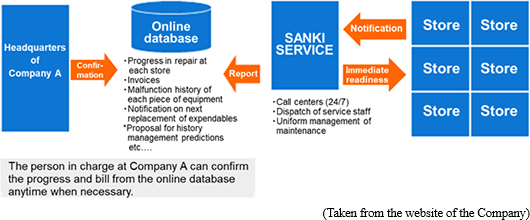 (Situation after resolution of the issues)
(Situation after resolution of the issues)
 The history management function of the online system has enabled formulation of plans to replace expendables, making it possible to grasp budgets.
The history management function of the online system has enabled formulation of plans to replace expendables, making it possible to grasp budgets.
 The status of progress with maintenance at each store has been made available all the time on a dedicated web page via the online system, enabling the employees of the client company to share the status of each store effectively within departments.
The status of progress with maintenance at each store has been made available all the time on a dedicated web page via the online system, enabling the employees of the client company to share the status of each store effectively within departments.
 The efficiency of the maintenance management has been improved, through which human resources have been successfully concentrated on and dedicated to the core sections, such as development.
The efficiency of the maintenance management has been improved, through which human resources have been successfully concentrated on and dedicated to the core sections, such as development.
 Troubles arising out of deteriorated expendables can be forestalled, decreasing the frequency of urgent troubles.
[Case 3. Proposal made to a leading food supermarket for facility management (FM)]
Troubles arising out of deteriorated expendables can be forestalled, decreasing the frequency of urgent troubles.
[Case 3. Proposal made to a leading food supermarket for facility management (FM)]
No. of target stores: About 60
Target area: Kansai region
Operating hours: 24 hours a day, 365 days a year
(Client's current situation and issues revealed through interview)
 The head office bore enormous administrative burdens, and indirect costs (personnel expenses) were increasing.
The head office bore enormous administrative burdens, and indirect costs (personnel expenses) were increasing.
 The client used multiple maintenance providers and thus could not manage maintenance in a unified manner, resulting in a huge total cost for repair (the economies of scale were not used properly).
The client used multiple maintenance providers and thus could not manage maintenance in a unified manner, resulting in a huge total cost for repair (the economies of scale were not used properly).
 The client was worried about losing opportunity because no sufficient structure for arranging maintenance was established and needs for equipment repair during holidays and at night were not met.
The client was worried about losing opportunity because no sufficient structure for arranging maintenance was established and needs for equipment repair during holidays and at night were not met.
 Information was not put together or utilized appropriately because the client used different repair providers for each store or piece of equipment.
Information was not put together or utilized appropriately because the client used different repair providers for each store or piece of equipment.
 The employees in charge of equipment are aging, casting a shadow over the future organizational structure.
The employees in charge of equipment are aging, casting a shadow over the future organizational structure.
The Company brought forward the following proposal in response to such circumstances:
 The repairing history of each piece of equipment can be collected with the Company centrally serving as an agent for maintenance work, which makes it possible to predict the tendency of expendables, and malfunctions of equipment of the same model used at different stores.
The repairing history of each piece of equipment can be collected with the Company centrally serving as an agent for maintenance work, which makes it possible to predict the tendency of expendables, and malfunctions of equipment of the same model used at different stores.
 The burdens on the head office can be lightened by outsourcing all the store management operations, including security and maintenance, to the Company.
② Specific Manufacturer's Product Maintenance Business
The burdens on the head office can be lightened by outsourcing all the store management operations, including security and maintenance, to the Company.
② Specific Manufacturer's Product Maintenance Business
As a store designated for manufacturer services for Panasonic Commercial Equipment Systems Co., Ltd., which has engaged in sales, installation, and services regarding professional-use equipment and systems in the Panasonic Group, the Company offers regular inspection and repairing services for a multitude of equipment for business use, including large-sized air conditioning equipment, at the delivery destinations to which the Panasonic Group manufactured and sold the equipment.
In recent years, the Company has been expanding its business domain through various approaches, such as inverter installation work(*) accompanying large-sized air conditioning equipment, maintenance services for electrical equipment other than large air conditioners, and plumbing and sanitary facilities, and upgrade or replacement of large-scale equipment.
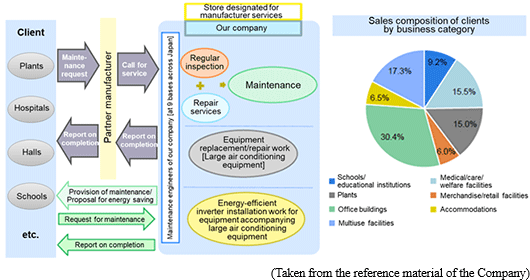 *Inverter installation work
The pumps used in air conditioning equipment circulate water through the rotating motion of motors. A motor fully rotates all the time while electric current is flowing, and the amount of circulating water is sometimes excessive. By decreasing the rotation speed of a motor and adjusting the amount of water with an "inverter," the equipment that controls the rate of motor rotation, electricity consumed by the motor can be reduced and consequently power can be saved. The work to install an inverter to an air conditioner is referred to as inverter installation work.
*Inverter installation work
The pumps used in air conditioning equipment circulate water through the rotating motion of motors. A motor fully rotates all the time while electric current is flowing, and the amount of circulating water is sometimes excessive. By decreasing the rotation speed of a motor and adjusting the amount of water with an "inverter," the equipment that controls the rate of motor rotation, electricity consumed by the motor can be reduced and consequently power can be saved. The work to install an inverter to an air conditioner is referred to as inverter installation work.
In the Specific Manufacturer's Product Maintenance Business, due to these business characteristics, the Company has served only for one client company, which is Panasonic Commercial Equipment Systems.
Maintenance of air conditioning equipment is a niche industry in which new companies rarely break ground because the equipment management company of each manufacturer group has entrusted multiple maintenance providers with maintenance of their air conditioning equipment, and there are barriers between manufacturers in terms of techniques and equipment.
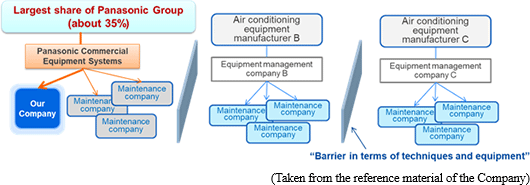
The Company has secured the largest market share (in-house share within Panasonic Commercial Equipment Systems) of about 20% all across Japan, which becomes approximately 40% when limited to Tokyo, Nagoya, and Osaka. As mentioned in Corporate History, the Company has successfully cemented the relationship with the Panasonic Group by engaging in maintenance of air conditioning equipment manufactured by the Group in an earlier stage. Besides, among the companies affiliated with the Panasonic Group for maintenance of the Group's air conditioning equipment, the Company has been substantially the only company that is capable of providing maintenance services in a nationwide scale because there is no other company than SANKI SERVICE that has employed over 300 workers. These are the secrets behind the greatest share.
As manufacturers tend to entrust management uniformly to large-sized companies with accumulated business results from the perspectives of high technical capabilities and efficiency, the Company aims to secure by far the largest share through further enhancement of its maintenance techniques.
The top market share has led not only to business stability but also to new business expansion.
The Company has dominated almost all the opportunities for proposal in the field of air conditioning equipment maintenance. For instance, in the aforementioned energy-saving inverter installation work, the Company is capable of offering a one-stop service, including on-site examination, effect estimation, proposal for installation, installation work, and post-installation services. The partnership forged between the Company and major leasing companies has made it possible to install inverters of the latest model without any initial investment, allowing end users to obtain a pronounced effect of energy saving. In addition, the Company will be able to earn new revenue, which is achievement rewards brought according to the amount of electricity reduced. Furthermore, the Company considers that expansion of this energy saving proposal to the "Comprehensive Maintenance Business" will generate more considerable business opportunities.
Almost all the staff members devoting to maintenance services are employed by the Company, and it is propelling further enhancement and cultivation of its workers' technical capabilities know-how through full-fledged employee education and training.
③ Energy Saving Business
The Company presents proposal for energy-saving work and equipment installation and offers construction services to the clients of the Comprehensive Maintenance and Specific Manufacturer's Product Maintenance Businesses.
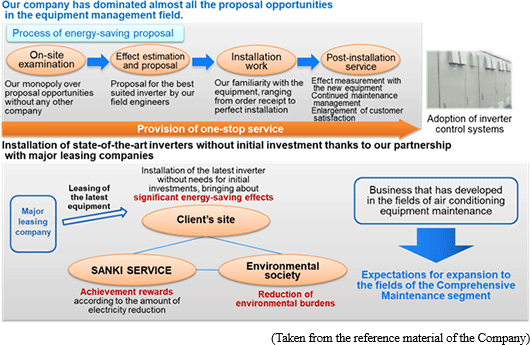
The Company's proposal ranging from introduction of inverter control systems to installation of inverters in the pumps of air conditioning equipment, upgrade and replacement of air conditioning and heat source equipment, installation of LED lights, and cutting maximum power consumption. It plans to continue enriching the lineup of energy-saving services.
Since the Company can grasp the situation by the clients of the Comprehensive Maintenance and Specific Manufacturer's Product Maintenance Businesses and make proposal through on-site examination, it has monopolized almost all the proposal opportunities, facing nearly no competitor.
Besides, the partnership between the Company and major leasing companies does not require client companies to pay huge initial investment for installing state-of-the-art inverters.
Although the Energy Saving Business originates from the field of maintenance services for air conditioning equipment, the Company is expecting further growth in the Comprehensive Maintenance field.
[Case. Proposal made to a confectionary manufacturer with over 20 stores for energy saving]
(Client's current situation and issues revealed through interview)
 The client was highly aware of cost-related issues and had looked for points and opportunities to cut down on costs.
The client was highly aware of cost-related issues and had looked for points and opportunities to cut down on costs.
 The client operated using cooling equipment 24 hours a day throughout a year, it was expected that the costs could be reduced.
The client operated using cooling equipment 24 hours a day throughout a year, it was expected that the costs could be reduced.
Thus, the Company brought forward the following proposal:
"As installation of an inverter control system to the air conditioning equipment (absorption water chiller heater) running 24 hours a day will enable power adjustment, costs will be reduced significantly, and the cost of installing the system will be recovered in 3 years."
 (Situation after resolution of the issues)
(Situation after resolution of the issues)
As the numeric values in the first year of the installation were as estimated and it was expected that the amount invested would be recovered in 3 years, the client decided to install the second system.
*The recovery period with the inverter system running 24 hours a day
【1-5 Characteristics and strengths】
◎ Stable subscription-based business
Although the Company has served only for one client, Panasonic Commercial Equipment Systems, in the Specific Manufacturer's Product Maintenance Business and thus a rapid growth cannot be expected, stable sales growth can be expected through regular inspection, repair, and other services. In addition, there is very little chance of price competition stimulated by new market entry, enabling the Company to maintain a stable profit rate.
◎ Superior technical capabilities
As mentioned earlier, in the Specific Manufacturer's Product Maintenance Business, almost 100% of the staff providing maintenance services are the employees of the Company, and therefore, it is possible to thoroughly educate and train the workers through hands-on training and on-the-job training.
Thanks to such meticulous training programs, the employees' technical abilities are being brushed up and know-how is being cultivated further, which has provided the Company with a considerable competitive edge against competitors not only in the Specific Manufacturer's Product Maintenance Business but also in the Comprehensive Maintenance Business that aims for further expansion.
【1-6 ROE Analysis】

Leverage declined due to the steady accumulation of profit, but ROE grew even further, mainly because of the increase in the net income margin.
The estimated net income margin this term is 4.64%, and the company will continue to maintain a high ROE.
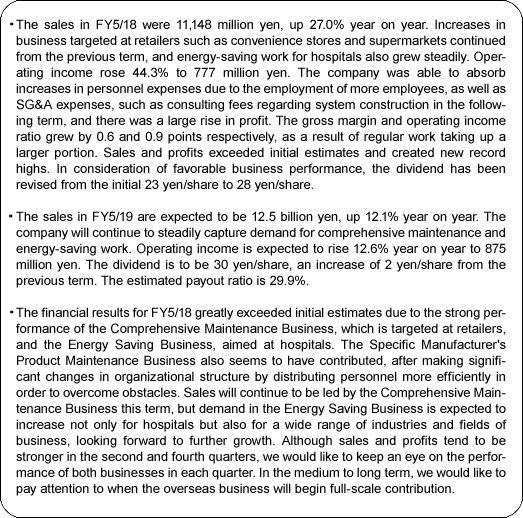
 In addition to the aforementioned philosophy, the Company has cited "promise," "greetings," "dialogue," "youth," and "skills" as its "5 customer-trust-building rules of conduct."
【1-3 Market environment】
As mentioned later, while it is hardly likely that restaurants and retail stores using equipment of various kinds, such as air conditioners, heating and cooling instruments, and kitchen equipment, can increase sales significantly under the deflationary environment, cost management will be considered the most important point for fighting through the competition.
Restaurants and retail stores that are propelling opening of chain stores, in particular, have strong needs for total cost reduction by managing each piece of equipment in accordance with a single national-scale standard.
The Company estimates the scale of the Comprehensive Maintenance segment at about 3 trillion yen (*), and considers forging ahead proactively with development of this broad market.
*With regard to the Company's major clients in 3 business categories (food service, distribution, and entertainment), it is assumed that maintenance cost makes up 3% of the sales of their chain stores operating all across Japan.
The Company's major competitors include some listed companies, such as Nippon Air Conditioning Services Co., Ltd. (4658; TSE 1st section) and Shin Maint Holdings Co., Ltd. (6086; TSE Mothers), and several unlisted companies. In the Comprehensive Maintenance segment, the Company has to vie with services departments of equipment manufacturers.
In order to compete with these companies, SANKI SERVICE has performed self-analysis, concluding that its strengths are "enriched call center services available all year round," "capabilities to deal with emergencies nationwide," "advanced systematization, including online systems," and "abilities to handle equipment of every manufacturer and kind."
In addition to the aforementioned philosophy, the Company has cited "promise," "greetings," "dialogue," "youth," and "skills" as its "5 customer-trust-building rules of conduct."
【1-3 Market environment】
As mentioned later, while it is hardly likely that restaurants and retail stores using equipment of various kinds, such as air conditioners, heating and cooling instruments, and kitchen equipment, can increase sales significantly under the deflationary environment, cost management will be considered the most important point for fighting through the competition.
Restaurants and retail stores that are propelling opening of chain stores, in particular, have strong needs for total cost reduction by managing each piece of equipment in accordance with a single national-scale standard.
The Company estimates the scale of the Comprehensive Maintenance segment at about 3 trillion yen (*), and considers forging ahead proactively with development of this broad market.
*With regard to the Company's major clients in 3 business categories (food service, distribution, and entertainment), it is assumed that maintenance cost makes up 3% of the sales of their chain stores operating all across Japan.
The Company's major competitors include some listed companies, such as Nippon Air Conditioning Services Co., Ltd. (4658; TSE 1st section) and Shin Maint Holdings Co., Ltd. (6086; TSE Mothers), and several unlisted companies. In the Comprehensive Maintenance segment, the Company has to vie with services departments of equipment manufacturers.
In order to compete with these companies, SANKI SERVICE has performed self-analysis, concluding that its strengths are "enriched call center services available all year round," "capabilities to deal with emergencies nationwide," "advanced systematization, including online systems," and "abilities to handle equipment of every manufacturer and kind."
 【1-4 Business contents】
1. Business Field
The Company engages in 3 businesses, including the "Comprehensive Maintenance Business," "Specific Manufacturer's Product Maintenance Business," and "Energy Saving Business."
*The reporting segments were the following 2 segments, "Air Conditioning Equipment Maintenance Business" and "Comprehensive Maintenance Business," up until the term ended May 2017; however, in the term ended May 2018, the Company changed its organizational structure with the aim of increasing its company-wide productivity and expeditiously providing services with high added-value by gathering personnel in charge of sales who had been allocated to each business department for establishment of a centralized point of contact, and managing its own maintenance engineers uniformly for propelling multi-skill development. As a result of the reconsideration of reporting segments with business expansion, including these changes in the corporate structure, and the actual situation of the business management system taken into account, the Company has judged that it is reasonable to deem the Group's businesses in a unified way and appropriate to use a single reporting segment.
① Comprehensive Maintenance Business
The Comprehensive Maintenance Business aims to expand business to larger markets using the techniques cultivated in the Specific Manufacturer's Product Maintenance Business.
【1-4 Business contents】
1. Business Field
The Company engages in 3 businesses, including the "Comprehensive Maintenance Business," "Specific Manufacturer's Product Maintenance Business," and "Energy Saving Business."
*The reporting segments were the following 2 segments, "Air Conditioning Equipment Maintenance Business" and "Comprehensive Maintenance Business," up until the term ended May 2017; however, in the term ended May 2018, the Company changed its organizational structure with the aim of increasing its company-wide productivity and expeditiously providing services with high added-value by gathering personnel in charge of sales who had been allocated to each business department for establishment of a centralized point of contact, and managing its own maintenance engineers uniformly for propelling multi-skill development. As a result of the reconsideration of reporting segments with business expansion, including these changes in the corporate structure, and the actual situation of the business management system taken into account, the Company has judged that it is reasonable to deem the Group's businesses in a unified way and appropriate to use a single reporting segment.
① Comprehensive Maintenance Business
The Comprehensive Maintenance Business aims to expand business to larger markets using the techniques cultivated in the Specific Manufacturer's Product Maintenance Business.
 Targeting the food service industry and retail chain stores, which are its major clients, the Company has comprehensively undertaken maintenance services for air conditioning equipment, kitchen equipment, freezers and refrigerators, electrical equipment, plumbing and sanitary facilities, and firefighting equipment, regardless of manufacturers and models.
In the food service and retail industries, chain stores that have a competitive edge in terms of financial power and economies of scale are increasing market share under the prolonged deflationary environment; however, it is difficult even for the chain stores to rapidly boost sales, and cost management is the high-profile issue for winning the fierce competition.
Even under such circumstances, in the case of many chain stores, the chain headquarters itself or each chain store requests the business operator specializing in each piece of equipment for maintenance, inspection, and troubleshooting. This has made it not only difficult for the chain stores to focus on their regular businesses but also impossible for them to perform proper cost management in terms of time and money due to the variables in service quality, post-maintenance reports, and prices.
In contrast, the Company enters into a bundled contract with the headquarters of each chain store and offers intensive management of each piece of equipment in accordance with a single nationwide standard. Therefore, SANKI SERVICE can control the service quality and price by serving as the one that is solely responsible for receipt of requests and submission of reports, which allows client companies to concentrate on their core businesses and properly manage costs.
Targeting the food service industry and retail chain stores, which are its major clients, the Company has comprehensively undertaken maintenance services for air conditioning equipment, kitchen equipment, freezers and refrigerators, electrical equipment, plumbing and sanitary facilities, and firefighting equipment, regardless of manufacturers and models.
In the food service and retail industries, chain stores that have a competitive edge in terms of financial power and economies of scale are increasing market share under the prolonged deflationary environment; however, it is difficult even for the chain stores to rapidly boost sales, and cost management is the high-profile issue for winning the fierce competition.
Even under such circumstances, in the case of many chain stores, the chain headquarters itself or each chain store requests the business operator specializing in each piece of equipment for maintenance, inspection, and troubleshooting. This has made it not only difficult for the chain stores to focus on their regular businesses but also impossible for them to perform proper cost management in terms of time and money due to the variables in service quality, post-maintenance reports, and prices.
In contrast, the Company enters into a bundled contract with the headquarters of each chain store and offers intensive management of each piece of equipment in accordance with a single nationwide standard. Therefore, SANKI SERVICE can control the service quality and price by serving as the one that is solely responsible for receipt of requests and submission of reports, which allows client companies to concentrate on their core businesses and properly manage costs.
 In addition, the Company can respond swiftly through its call centers available 24 hours a day, 364 days a year, reports on repair using its website, and real-time risk forecasts drawn from a variety of data, such as the usage status and time-related deterioration of equipment, accurately fulfilling the needs of the food service and retail industries that cannot suspend business even when trouble occurs.
Furthermore, the Company covers agent businesses such as production of fiscal budgets and dead-line work witnessing, businesses related to compliance including tasks to deal with legal amendments and submit notifications to administrative organs, formulation of security plans for opening new shops and redesigning existing shops, facility cleaning and prevention of insects and rats, and tenant replacement.
As mentioned above, the Company's strengths are not only capabilities to deal with simple repairs and malfunctions but also the ability to provide "optimum management of total costs," which is aimed not just at cost reduction through outsourcing, including indirect costs, for which the Company has gained excellent reputation from client companies that hope to concentrate business resources to their respective priority fields.
Both about 200 maintenance engineers of the Company, who work for the 13 bases across Japan, and partner companies to which the Company has entrusted maintenance works (about 2,000 companies in Japan) visit clients' stores and provide maintenance services.
<Example proposals in Comprehensive Maintenance Business>
[Case 1. Proposal made to a major convenience store chain for uniform management of maintenance of air conditioning equipment]
No. of target stores: About 20,000
Target area: Throughout Japan
Operating hours: 24 hours a day, 365 days a year
(Client's current situation and issues revealed through interview)
In addition, the Company can respond swiftly through its call centers available 24 hours a day, 364 days a year, reports on repair using its website, and real-time risk forecasts drawn from a variety of data, such as the usage status and time-related deterioration of equipment, accurately fulfilling the needs of the food service and retail industries that cannot suspend business even when trouble occurs.
Furthermore, the Company covers agent businesses such as production of fiscal budgets and dead-line work witnessing, businesses related to compliance including tasks to deal with legal amendments and submit notifications to administrative organs, formulation of security plans for opening new shops and redesigning existing shops, facility cleaning and prevention of insects and rats, and tenant replacement.
As mentioned above, the Company's strengths are not only capabilities to deal with simple repairs and malfunctions but also the ability to provide "optimum management of total costs," which is aimed not just at cost reduction through outsourcing, including indirect costs, for which the Company has gained excellent reputation from client companies that hope to concentrate business resources to their respective priority fields.
Both about 200 maintenance engineers of the Company, who work for the 13 bases across Japan, and partner companies to which the Company has entrusted maintenance works (about 2,000 companies in Japan) visit clients' stores and provide maintenance services.
<Example proposals in Comprehensive Maintenance Business>
[Case 1. Proposal made to a major convenience store chain for uniform management of maintenance of air conditioning equipment]
No. of target stores: About 20,000
Target area: Throughout Japan
Operating hours: 24 hours a day, 365 days a year
(Client's current situation and issues revealed through interview)
 The client traditionally entrusted maintenance to a business operator that is not a specialist. Air conditioning troubles were not solved; on the contrary, the number of troubles kept going up.
The client traditionally entrusted maintenance to a business operator that is not a specialist. Air conditioning troubles were not solved; on the contrary, the number of troubles kept going up.
 The data accumulated were not used properly for improvement.
The Company brought forward the following proposal in response to such circumstances:
The data accumulated were not used properly for improvement.
The Company brought forward the following proposal in response to such circumstances:
 Unexpected needs for repair can be reduced by regularly cleaning and inspecting air conditioning equipment.
Unexpected needs for repair can be reduced by regularly cleaning and inspecting air conditioning equipment.
 Management by the Company that specializes in air conditioning systems makes it possible to present proposal for improvement which takes advantage of the accumulated data.
[Case 2. Proposal made to one of the largest ready-made meal (boxed lunch) chains in Japan for repair request acceptance by call centers]
No. of target stores: About 3,000
Target area: Throughout Japan
Operating hours: 24 hours a day, 365 days a year
(Client's current situation and issues revealed through interview)
Management by the Company that specializes in air conditioning systems makes it possible to present proposal for improvement which takes advantage of the accumulated data.
[Case 2. Proposal made to one of the largest ready-made meal (boxed lunch) chains in Japan for repair request acceptance by call centers]
No. of target stores: About 3,000
Target area: Throughout Japan
Operating hours: 24 hours a day, 365 days a year
(Client's current situation and issues revealed through interview)
 The head office bore enormous administrative burdens, and indirect costs (personnel expenses) were increasing.
The head office bore enormous administrative burdens, and indirect costs (personnel expenses) were increasing.
 The client used multiple maintenance providers and thus could not manage maintenance in a unified manner, resulting in a huge total cost for repair (the economies of scale were not used properly).
The client used multiple maintenance providers and thus could not manage maintenance in a unified manner, resulting in a huge total cost for repair (the economies of scale were not used properly).
 An increase or decrease in the number of stores made it difficult to control personnel expenses.
An increase or decrease in the number of stores made it difficult to control personnel expenses.
 The client was worried about losing opportunity because no sufficient structure for arranging maintenance was established and needs for repairing equipment during holidays and at night were not met.
The client was worried about losing opportunity because no sufficient structure for arranging maintenance was established and needs for repairing equipment during holidays and at night were not met.
 Information was not put together or utilized appropriately because the client used different repair providers for each store or piece of equipment.
The Company brought forward the following proposal in response to such circumstances:
Information was not put together or utilized appropriately because the client used different repair providers for each store or piece of equipment.
The Company brought forward the following proposal in response to such circumstances:
 The repair history of each piece of equipment can be collected with the Company centrally serving as an agent for maintenance work, which makes it possible to predict the tendency of expendables, and malfunctions of equipment of the same model used at different stores.
The repair history of each piece of equipment can be collected with the Company centrally serving as an agent for maintenance work, which makes it possible to predict the tendency of expendables, and malfunctions of equipment of the same model used at different stores.
 Needs to change the number of administrative personnel according to an increase or decrease in the number of stores can be eliminated by outsourcing all the maintenance work to the Company.
Needs to change the number of administrative personnel according to an increase or decrease in the number of stores can be eliminated by outsourcing all the maintenance work to the Company.
 Reports and invoices can be managed easily through the Company's online system.
Reports and invoices can be managed easily through the Company's online system.
 As the call centers are available all year round, troubles of great urgency can be readily dealt with and opportunity loss can be prevented.
As the call centers are available all year round, troubles of great urgency can be readily dealt with and opportunity loss can be prevented.
 (Situation after resolution of the issues)
(Situation after resolution of the issues)
 The history management function of the online system has enabled formulation of plans to replace expendables, making it possible to grasp budgets.
The history management function of the online system has enabled formulation of plans to replace expendables, making it possible to grasp budgets.
 The status of progress with maintenance at each store has been made available all the time on a dedicated web page via the online system, enabling the employees of the client company to share the status of each store effectively within departments.
The status of progress with maintenance at each store has been made available all the time on a dedicated web page via the online system, enabling the employees of the client company to share the status of each store effectively within departments.
 The efficiency of the maintenance management has been improved, through which human resources have been successfully concentrated on and dedicated to the core sections, such as development.
The efficiency of the maintenance management has been improved, through which human resources have been successfully concentrated on and dedicated to the core sections, such as development.
 Troubles arising out of deteriorated expendables can be forestalled, decreasing the frequency of urgent troubles.
[Case 3. Proposal made to a leading food supermarket for facility management (FM)]
No. of target stores: About 60
Target area: Kansai region
Operating hours: 24 hours a day, 365 days a year
(Client's current situation and issues revealed through interview)
Troubles arising out of deteriorated expendables can be forestalled, decreasing the frequency of urgent troubles.
[Case 3. Proposal made to a leading food supermarket for facility management (FM)]
No. of target stores: About 60
Target area: Kansai region
Operating hours: 24 hours a day, 365 days a year
(Client's current situation and issues revealed through interview)
 The head office bore enormous administrative burdens, and indirect costs (personnel expenses) were increasing.
The head office bore enormous administrative burdens, and indirect costs (personnel expenses) were increasing.
 The client used multiple maintenance providers and thus could not manage maintenance in a unified manner, resulting in a huge total cost for repair (the economies of scale were not used properly).
The client used multiple maintenance providers and thus could not manage maintenance in a unified manner, resulting in a huge total cost for repair (the economies of scale were not used properly).
 The client was worried about losing opportunity because no sufficient structure for arranging maintenance was established and needs for equipment repair during holidays and at night were not met.
The client was worried about losing opportunity because no sufficient structure for arranging maintenance was established and needs for equipment repair during holidays and at night were not met.
 Information was not put together or utilized appropriately because the client used different repair providers for each store or piece of equipment.
Information was not put together or utilized appropriately because the client used different repair providers for each store or piece of equipment.
 The employees in charge of equipment are aging, casting a shadow over the future organizational structure.
The Company brought forward the following proposal in response to such circumstances:
The employees in charge of equipment are aging, casting a shadow over the future organizational structure.
The Company brought forward the following proposal in response to such circumstances:
 The repairing history of each piece of equipment can be collected with the Company centrally serving as an agent for maintenance work, which makes it possible to predict the tendency of expendables, and malfunctions of equipment of the same model used at different stores.
The repairing history of each piece of equipment can be collected with the Company centrally serving as an agent for maintenance work, which makes it possible to predict the tendency of expendables, and malfunctions of equipment of the same model used at different stores.
 The burdens on the head office can be lightened by outsourcing all the store management operations, including security and maintenance, to the Company.
② Specific Manufacturer's Product Maintenance Business
As a store designated for manufacturer services for Panasonic Commercial Equipment Systems Co., Ltd., which has engaged in sales, installation, and services regarding professional-use equipment and systems in the Panasonic Group, the Company offers regular inspection and repairing services for a multitude of equipment for business use, including large-sized air conditioning equipment, at the delivery destinations to which the Panasonic Group manufactured and sold the equipment.
In recent years, the Company has been expanding its business domain through various approaches, such as inverter installation work(*) accompanying large-sized air conditioning equipment, maintenance services for electrical equipment other than large air conditioners, and plumbing and sanitary facilities, and upgrade or replacement of large-scale equipment.
The burdens on the head office can be lightened by outsourcing all the store management operations, including security and maintenance, to the Company.
② Specific Manufacturer's Product Maintenance Business
As a store designated for manufacturer services for Panasonic Commercial Equipment Systems Co., Ltd., which has engaged in sales, installation, and services regarding professional-use equipment and systems in the Panasonic Group, the Company offers regular inspection and repairing services for a multitude of equipment for business use, including large-sized air conditioning equipment, at the delivery destinations to which the Panasonic Group manufactured and sold the equipment.
In recent years, the Company has been expanding its business domain through various approaches, such as inverter installation work(*) accompanying large-sized air conditioning equipment, maintenance services for electrical equipment other than large air conditioners, and plumbing and sanitary facilities, and upgrade or replacement of large-scale equipment.
 *Inverter installation work
The pumps used in air conditioning equipment circulate water through the rotating motion of motors. A motor fully rotates all the time while electric current is flowing, and the amount of circulating water is sometimes excessive. By decreasing the rotation speed of a motor and adjusting the amount of water with an "inverter," the equipment that controls the rate of motor rotation, electricity consumed by the motor can be reduced and consequently power can be saved. The work to install an inverter to an air conditioner is referred to as inverter installation work.
In the Specific Manufacturer's Product Maintenance Business, due to these business characteristics, the Company has served only for one client company, which is Panasonic Commercial Equipment Systems.
Maintenance of air conditioning equipment is a niche industry in which new companies rarely break ground because the equipment management company of each manufacturer group has entrusted multiple maintenance providers with maintenance of their air conditioning equipment, and there are barriers between manufacturers in terms of techniques and equipment.
*Inverter installation work
The pumps used in air conditioning equipment circulate water through the rotating motion of motors. A motor fully rotates all the time while electric current is flowing, and the amount of circulating water is sometimes excessive. By decreasing the rotation speed of a motor and adjusting the amount of water with an "inverter," the equipment that controls the rate of motor rotation, electricity consumed by the motor can be reduced and consequently power can be saved. The work to install an inverter to an air conditioner is referred to as inverter installation work.
In the Specific Manufacturer's Product Maintenance Business, due to these business characteristics, the Company has served only for one client company, which is Panasonic Commercial Equipment Systems.
Maintenance of air conditioning equipment is a niche industry in which new companies rarely break ground because the equipment management company of each manufacturer group has entrusted multiple maintenance providers with maintenance of their air conditioning equipment, and there are barriers between manufacturers in terms of techniques and equipment.
 The Company has secured the largest market share (in-house share within Panasonic Commercial Equipment Systems) of about 20% all across Japan, which becomes approximately 40% when limited to Tokyo, Nagoya, and Osaka. As mentioned in Corporate History, the Company has successfully cemented the relationship with the Panasonic Group by engaging in maintenance of air conditioning equipment manufactured by the Group in an earlier stage. Besides, among the companies affiliated with the Panasonic Group for maintenance of the Group's air conditioning equipment, the Company has been substantially the only company that is capable of providing maintenance services in a nationwide scale because there is no other company than SANKI SERVICE that has employed over 300 workers. These are the secrets behind the greatest share.
As manufacturers tend to entrust management uniformly to large-sized companies with accumulated business results from the perspectives of high technical capabilities and efficiency, the Company aims to secure by far the largest share through further enhancement of its maintenance techniques.
The top market share has led not only to business stability but also to new business expansion.
The Company has dominated almost all the opportunities for proposal in the field of air conditioning equipment maintenance. For instance, in the aforementioned energy-saving inverter installation work, the Company is capable of offering a one-stop service, including on-site examination, effect estimation, proposal for installation, installation work, and post-installation services. The partnership forged between the Company and major leasing companies has made it possible to install inverters of the latest model without any initial investment, allowing end users to obtain a pronounced effect of energy saving. In addition, the Company will be able to earn new revenue, which is achievement rewards brought according to the amount of electricity reduced. Furthermore, the Company considers that expansion of this energy saving proposal to the "Comprehensive Maintenance Business" will generate more considerable business opportunities.
Almost all the staff members devoting to maintenance services are employed by the Company, and it is propelling further enhancement and cultivation of its workers' technical capabilities know-how through full-fledged employee education and training.
③ Energy Saving Business
The Company presents proposal for energy-saving work and equipment installation and offers construction services to the clients of the Comprehensive Maintenance and Specific Manufacturer's Product Maintenance Businesses.
The Company has secured the largest market share (in-house share within Panasonic Commercial Equipment Systems) of about 20% all across Japan, which becomes approximately 40% when limited to Tokyo, Nagoya, and Osaka. As mentioned in Corporate History, the Company has successfully cemented the relationship with the Panasonic Group by engaging in maintenance of air conditioning equipment manufactured by the Group in an earlier stage. Besides, among the companies affiliated with the Panasonic Group for maintenance of the Group's air conditioning equipment, the Company has been substantially the only company that is capable of providing maintenance services in a nationwide scale because there is no other company than SANKI SERVICE that has employed over 300 workers. These are the secrets behind the greatest share.
As manufacturers tend to entrust management uniformly to large-sized companies with accumulated business results from the perspectives of high technical capabilities and efficiency, the Company aims to secure by far the largest share through further enhancement of its maintenance techniques.
The top market share has led not only to business stability but also to new business expansion.
The Company has dominated almost all the opportunities for proposal in the field of air conditioning equipment maintenance. For instance, in the aforementioned energy-saving inverter installation work, the Company is capable of offering a one-stop service, including on-site examination, effect estimation, proposal for installation, installation work, and post-installation services. The partnership forged between the Company and major leasing companies has made it possible to install inverters of the latest model without any initial investment, allowing end users to obtain a pronounced effect of energy saving. In addition, the Company will be able to earn new revenue, which is achievement rewards brought according to the amount of electricity reduced. Furthermore, the Company considers that expansion of this energy saving proposal to the "Comprehensive Maintenance Business" will generate more considerable business opportunities.
Almost all the staff members devoting to maintenance services are employed by the Company, and it is propelling further enhancement and cultivation of its workers' technical capabilities know-how through full-fledged employee education and training.
③ Energy Saving Business
The Company presents proposal for energy-saving work and equipment installation and offers construction services to the clients of the Comprehensive Maintenance and Specific Manufacturer's Product Maintenance Businesses.
 The Company's proposal ranging from introduction of inverter control systems to installation of inverters in the pumps of air conditioning equipment, upgrade and replacement of air conditioning and heat source equipment, installation of LED lights, and cutting maximum power consumption. It plans to continue enriching the lineup of energy-saving services.
Since the Company can grasp the situation by the clients of the Comprehensive Maintenance and Specific Manufacturer's Product Maintenance Businesses and make proposal through on-site examination, it has monopolized almost all the proposal opportunities, facing nearly no competitor.
Besides, the partnership between the Company and major leasing companies does not require client companies to pay huge initial investment for installing state-of-the-art inverters.
Although the Energy Saving Business originates from the field of maintenance services for air conditioning equipment, the Company is expecting further growth in the Comprehensive Maintenance field.
[Case. Proposal made to a confectionary manufacturer with over 20 stores for energy saving]
(Client's current situation and issues revealed through interview)
The Company's proposal ranging from introduction of inverter control systems to installation of inverters in the pumps of air conditioning equipment, upgrade and replacement of air conditioning and heat source equipment, installation of LED lights, and cutting maximum power consumption. It plans to continue enriching the lineup of energy-saving services.
Since the Company can grasp the situation by the clients of the Comprehensive Maintenance and Specific Manufacturer's Product Maintenance Businesses and make proposal through on-site examination, it has monopolized almost all the proposal opportunities, facing nearly no competitor.
Besides, the partnership between the Company and major leasing companies does not require client companies to pay huge initial investment for installing state-of-the-art inverters.
Although the Energy Saving Business originates from the field of maintenance services for air conditioning equipment, the Company is expecting further growth in the Comprehensive Maintenance field.
[Case. Proposal made to a confectionary manufacturer with over 20 stores for energy saving]
(Client's current situation and issues revealed through interview)
 The client was highly aware of cost-related issues and had looked for points and opportunities to cut down on costs.
The client was highly aware of cost-related issues and had looked for points and opportunities to cut down on costs.
 The client operated using cooling equipment 24 hours a day throughout a year, it was expected that the costs could be reduced.
Thus, the Company brought forward the following proposal: "As installation of an inverter control system to the air conditioning equipment (absorption water chiller heater) running 24 hours a day will enable power adjustment, costs will be reduced significantly, and the cost of installing the system will be recovered in 3 years."
The client operated using cooling equipment 24 hours a day throughout a year, it was expected that the costs could be reduced.
Thus, the Company brought forward the following proposal: "As installation of an inverter control system to the air conditioning equipment (absorption water chiller heater) running 24 hours a day will enable power adjustment, costs will be reduced significantly, and the cost of installing the system will be recovered in 3 years."
 (Situation after resolution of the issues)
As the numeric values in the first year of the installation were as estimated and it was expected that the amount invested would be recovered in 3 years, the client decided to install the second system.
*The recovery period with the inverter system running 24 hours a day
【1-5 Characteristics and strengths】
◎ Stable subscription-based business
Although the Company has served only for one client, Panasonic Commercial Equipment Systems, in the Specific Manufacturer's Product Maintenance Business and thus a rapid growth cannot be expected, stable sales growth can be expected through regular inspection, repair, and other services. In addition, there is very little chance of price competition stimulated by new market entry, enabling the Company to maintain a stable profit rate.
◎ Superior technical capabilities
As mentioned earlier, in the Specific Manufacturer's Product Maintenance Business, almost 100% of the staff providing maintenance services are the employees of the Company, and therefore, it is possible to thoroughly educate and train the workers through hands-on training and on-the-job training.
Thanks to such meticulous training programs, the employees' technical abilities are being brushed up and know-how is being cultivated further, which has provided the Company with a considerable competitive edge against competitors not only in the Specific Manufacturer's Product Maintenance Business but also in the Comprehensive Maintenance Business that aims for further expansion.
【1-6 ROE Analysis】
(Situation after resolution of the issues)
As the numeric values in the first year of the installation were as estimated and it was expected that the amount invested would be recovered in 3 years, the client decided to install the second system.
*The recovery period with the inverter system running 24 hours a day
【1-5 Characteristics and strengths】
◎ Stable subscription-based business
Although the Company has served only for one client, Panasonic Commercial Equipment Systems, in the Specific Manufacturer's Product Maintenance Business and thus a rapid growth cannot be expected, stable sales growth can be expected through regular inspection, repair, and other services. In addition, there is very little chance of price competition stimulated by new market entry, enabling the Company to maintain a stable profit rate.
◎ Superior technical capabilities
As mentioned earlier, in the Specific Manufacturer's Product Maintenance Business, almost 100% of the staff providing maintenance services are the employees of the Company, and therefore, it is possible to thoroughly educate and train the workers through hands-on training and on-the-job training.
Thanks to such meticulous training programs, the employees' technical abilities are being brushed up and know-how is being cultivated further, which has provided the Company with a considerable competitive edge against competitors not only in the Specific Manufacturer's Product Maintenance Business but also in the Comprehensive Maintenance Business that aims for further expansion.
【1-6 ROE Analysis】
 Leverage declined due to the steady accumulation of profit, but ROE grew even further, mainly because of the increase in the net income margin.
The estimated net income margin this term is 4.64%, and the company will continue to maintain a high ROE.
Leverage declined due to the steady accumulation of profit, but ROE grew even further, mainly because of the increase in the net income margin.
The estimated net income margin this term is 4.64%, and the company will continue to maintain a high ROE.
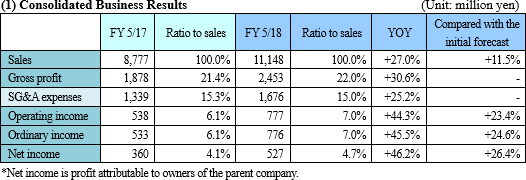 Double digit increases in sales and profit. Figures exceeded initial estimates and marked record highs.
Sales were 11,148 million yen, up 27.0% year on year. Increases in business targeted at retailers such as convenience stores and supermarkets continued from the previous term, and energy-saving work for hospitals also grew steadily.
Operating income rose 44.3% to 777 million yen. The company was able to absorb increases in personnel expenses due to the employment of more employees, as well as SG&A expenses, such as consulting fees regarding system construction in the following term, and there was a large rise in profit. The gross margin and operating income ratio grew by 0.6 and 0.9 points respectively, as a result of regular work taking up a larger portion.
Sales and profits exceeded initial estimates and created record highs. In consideration of favorable business performance, the dividend has been revised from the initial 23 yen/share to 28 yen/share.
Double digit increases in sales and profit. Figures exceeded initial estimates and marked record highs.
Sales were 11,148 million yen, up 27.0% year on year. Increases in business targeted at retailers such as convenience stores and supermarkets continued from the previous term, and energy-saving work for hospitals also grew steadily.
Operating income rose 44.3% to 777 million yen. The company was able to absorb increases in personnel expenses due to the employment of more employees, as well as SG&A expenses, such as consulting fees regarding system construction in the following term, and there was a large rise in profit. The gross margin and operating income ratio grew by 0.6 and 0.9 points respectively, as a result of regular work taking up a larger portion.
Sales and profits exceeded initial estimates and created record highs. In consideration of favorable business performance, the dividend has been revised from the initial 23 yen/share to 28 yen/share.
 The company's sales and profits tend to be heavily weighted towards the second and fourth quarters. They rose 37.2% and 31.5% respectively during this term’s fourth quarter, which was a significant increase from the same period last year.
The company's sales and profits tend to be heavily weighted towards the second and fourth quarters. They rose 37.2% and 31.5% respectively during this term’s fourth quarter, which was a significant increase from the same period last year.
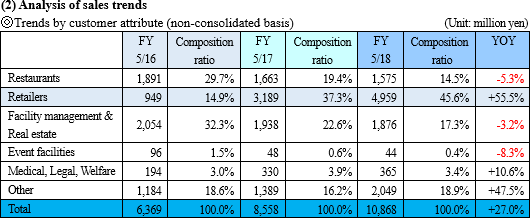 Sales targeted at retailers have expanded significantly in the last two years. There was also significant growth in "Others," which includes the Energy Saving Business targeted at hospitals.
Sales targeted at retailers have expanded significantly in the last two years. There was also significant growth in "Others," which includes the Energy Saving Business targeted at hospitals.
 Highly efficient, highly profitable regular work took up a larger portion, leading to improvement in profit margins.
Highly efficient, highly profitable regular work took up a larger portion, leading to improvement in profit margins.
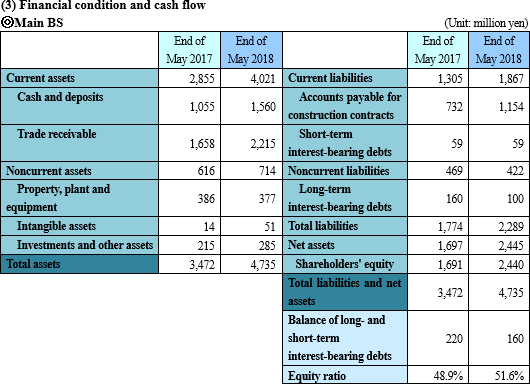 Due to an increase in cash and deposits and trade receivables, current assets were up 1,165 million yen from the end of the previous term. Noncurrent assets grew 97 million yen due to an increase in investment securities, and total assets rose 1,262 million yen to 4,735 million yen.
Total liabilities grew 515 million yen to 2,289 million yen, due to an increase in accounts payable for installation contracts and other factors.
Net assets grew 747 million yen to 2,445 million yen, due to increases in retained earnings, etc. The equity ratio rose 2.7% to 51.6% from the end of the previous term.
Due to an increase in cash and deposits and trade receivables, current assets were up 1,165 million yen from the end of the previous term. Noncurrent assets grew 97 million yen due to an increase in investment securities, and total assets rose 1,262 million yen to 4,735 million yen.
Total liabilities grew 515 million yen to 2,289 million yen, due to an increase in accounts payable for installation contracts and other factors.
Net assets grew 747 million yen to 2,445 million yen, due to increases in retained earnings, etc. The equity ratio rose 2.7% to 51.6% from the end of the previous term.
 The surplus of operating CF grew due to increased profits.
As more investment securities were acquired, the deficit of investing CF grew, and the surplus of free CF shrank.
Financing CF turned positive due to proceeds from issuance of common shares.
The cash position improved.
(4) Topics
◎ To begin construction of IT system in order to achieve long-term vision
The company has stated its long-term vision to achieve "sales of 50 billion yen (with an operating income ratio of 10%) with 1000 employees or more in the company." They recognize that in order to achieve this vision, management needs to address certain topics, such as "Expansion to new markets and clients," "Maintenance and expansion of existing markets and clients," "Development and expansion of new services," "Improvements in quality and speed for service and management work," and "Reduction of costs for service and management work."
Therefore, in addition to meeting the needs of the ever-growing Comprehensive Maintenance Business, the company decided that building an appropriate infrastructure was essential to address these issues. They raised funds by publicly offering stock (0.2 million shares, about 300 million yen), and invested in an IT system to be used mainly in the Comprehensive Maintenance Business.
This investment in IT will be used to make multiple improvements, such as "standardized lists of services," "centralized information management," "transparency for group management information," "stronger regulations," and "standardized facilities and business data across all forms of service." In particular, standardizing facilities and business data across all forms of service will lead to stronger proposals by being able to accurately answer client companies when asked about equipment (which equipment, when was it introduced, who is the manufacturer, etc.).
The IT system will be constructed during the current term, and operation is scheduled to begin from the next term.
◎ Started tree planting activities
As part of a project for the 40th anniversary of the company's founding, and as a contribution to society, they started a tree planting campaign this term.
Specifically, since Sept. 2017, employees and their families have participated in the "Sanki Service Forest" tree planting project along the Futtsu coastline in Chiba prefecture. In the future, the company plans to continue activities on a regular basis and work together towards making the "Sanki Service Forest" bigger and bigger along the Futtsu coastline.
The surplus of operating CF grew due to increased profits.
As more investment securities were acquired, the deficit of investing CF grew, and the surplus of free CF shrank.
Financing CF turned positive due to proceeds from issuance of common shares.
The cash position improved.
(4) Topics
◎ To begin construction of IT system in order to achieve long-term vision
The company has stated its long-term vision to achieve "sales of 50 billion yen (with an operating income ratio of 10%) with 1000 employees or more in the company." They recognize that in order to achieve this vision, management needs to address certain topics, such as "Expansion to new markets and clients," "Maintenance and expansion of existing markets and clients," "Development and expansion of new services," "Improvements in quality and speed for service and management work," and "Reduction of costs for service and management work."
Therefore, in addition to meeting the needs of the ever-growing Comprehensive Maintenance Business, the company decided that building an appropriate infrastructure was essential to address these issues. They raised funds by publicly offering stock (0.2 million shares, about 300 million yen), and invested in an IT system to be used mainly in the Comprehensive Maintenance Business.
This investment in IT will be used to make multiple improvements, such as "standardized lists of services," "centralized information management," "transparency for group management information," "stronger regulations," and "standardized facilities and business data across all forms of service." In particular, standardizing facilities and business data across all forms of service will lead to stronger proposals by being able to accurately answer client companies when asked about equipment (which equipment, when was it introduced, who is the manufacturer, etc.).
The IT system will be constructed during the current term, and operation is scheduled to begin from the next term.
◎ Started tree planting activities
As part of a project for the 40th anniversary of the company's founding, and as a contribution to society, they started a tree planting campaign this term.
Specifically, since Sept. 2017, employees and their families have participated in the "Sanki Service Forest" tree planting project along the Futtsu coastline in Chiba prefecture. In the future, the company plans to continue activities on a regular basis and work together towards making the "Sanki Service Forest" bigger and bigger along the Futtsu coastline.
 Double-digit increases in sales and profit expected this term
Sales are expected to increase 12.1% year on year to 12.5 billion yen. The company will continue to steadily capture demand for comprehensive maintenance and energy-saving work. Operating income is expected to rise 12.6% year on year to 875 million yen. The dividend is to be 30 yen/share, an increase of 2 yen/share from the previous term. The estimated payout ratio is 29.9%.
Double-digit increases in sales and profit expected this term
Sales are expected to increase 12.1% year on year to 12.5 billion yen. The company will continue to steadily capture demand for comprehensive maintenance and energy-saving work. Operating income is expected to rise 12.6% year on year to 875 million yen. The dividend is to be 30 yen/share, an increase of 2 yen/share from the previous term. The estimated payout ratio is 29.9%.
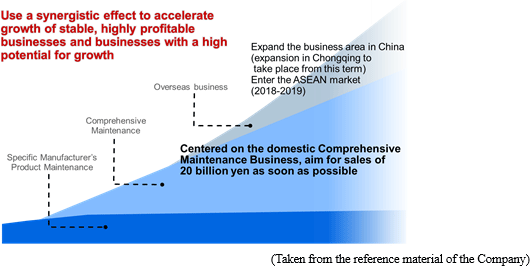 Regarding overseas business, this year the company will become active in Chongqing areas in China to expand the business in China. In addition, they are also conducting research to determine the needs in six other countries: Taiwan, Singapore, Indonesia, Thailand, Vietnam, and Malaysia.
Of these six, the company is considering developing local business models and cooperative partnerships in Thailand, Vietnam, and Singapore with the goal of establishing local subsidiaries in each of these countries in 2019.
Regarding overseas business, this year the company will become active in Chongqing areas in China to expand the business in China. In addition, they are also conducting research to determine the needs in six other countries: Taiwan, Singapore, Indonesia, Thailand, Vietnam, and Malaysia.
Of these six, the company is considering developing local business models and cooperative partnerships in Thailand, Vietnam, and Singapore with the goal of establishing local subsidiaries in each of these countries in 2019.
 ◎ Corporate Governance Report (Last updated on September 4, 2017)
<Reasons for Non-compliance with the Principles of the Corporate Governance Code (Excerpts)>
◎ Corporate Governance Report (Last updated on September 4, 2017)
<Reasons for Non-compliance with the Principles of the Corporate Governance Code (Excerpts)>
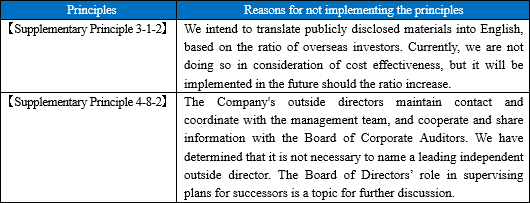 <Disclosure Based on the Principles of the Corporate Governance Code (Excerpts)>
<Disclosure Based on the Principles of the Corporate Governance Code (Excerpts)>
